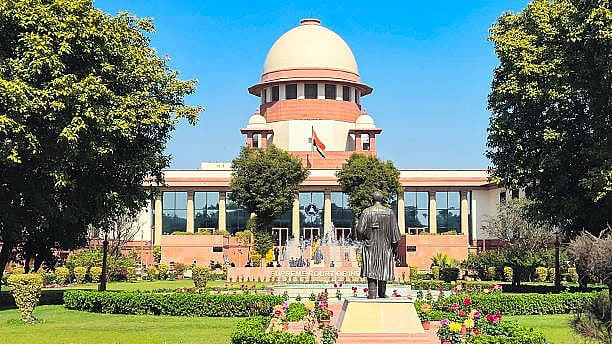
Supreme Court of India.
Credit: iStock Photo
New Delhi: The Supreme Court on Monday prima facie found no fault with the validity of the provision in the Waqf Amendment Act, 2025 which required that the property, to be permanently dedicated as a waqf, should only be a property, owned by the person dedicating it.
The court also rejected an argument against deletion of contentious 'Waqf by User' concept in the amended law, brought in to stop menace of encroachment upon government lands. It also prima facie upheld the provision mandating registration in all cases.
A bench of Chief Justice of India B R Gavai and Justice Augustine George Masih referred to the Treatise “Principles of Mahomedan Law (20th Edition)” by Mulla, to point out that only an “owner” of a property can create a waqf.
Further, the court noted, from the Key Quranic Verses specifically by Surah Al Baqarah, it can be seen that the very concept of creation of waqf is based on charity i.e., to spend one’s own wealth in the way of Allah.
"In any case, to do charity a person will have to do charity of his own property or the money owned by him. A charity cannot be done by a person of a property or money owned by a third person or a property owned by the government. In that view of the matter, we are of the prima facie view that such a requirement cannot be held to be arbitrary,'' the bench said.
The petitioners contended that “Waqf by User” is a concept which is recognised under the Muslim law and the deletion of the said provision is arbitrary.
To this, the bench said, right from 1923, in all the enactments, there was a requirement of registration of waqfs.
"We are, therefore, of the view that if Mutawallis for a period of 102 years could not get the waqf registered, as required under the earlier provisions, they cannot claim that they be allowed to continue with the waqf even if they are not registered,'' the bench said.
The petitioners also contended that in many cases there would be no waqf deeds available.
"If for 30 long years, the Mutawallis had chosen not to make an application for registration, they cannot be heard to say that the provision which now requires the application to be accompanied by a copy of the waqf deed is arbitrary,'' the bench said.
Further, if the legislature, on noticing misuse of the waqf properties, finds that after the enactment of the 2025 Act all such applications should be accompanied by a copy of the waqf deed, the same cannot be said to be arbitrary, the bench said.
"We are also of the view that if the legislature, in 2025, finds that on account of the concept of “Waqf by User”, huge government properties have been encroached upon and to stop the said menace, it takes steps for deletion of the said provision, the said amendment, prima facie, cannot be said to be arbitrary,'' the bench said.
The court cited the instance of the Andhra Pradesh Waqf Board, which had notified thousands of acres of land belonging to the Government as waqf property.
"After noticing such instances of misuse, if the legislature finds that the concept of “Waqf by User” has to be abolished and that too prospectively, in our view, the same cannot prima facie be said to be arbitrary,'' the bench said.
Having noted the government's submission that the said provision would not apply retrospectively, the court said, the contention of the petitioners that the lands vested in the waqfs would be grabbed by the government prima facie holds no water.
